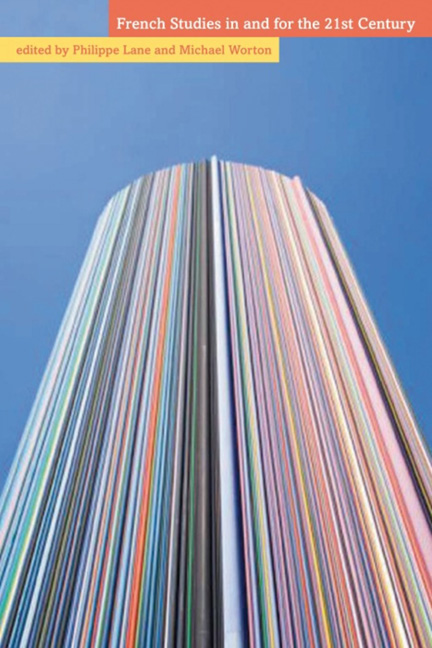Book contents
- Frontmatter
- Contents
- Notes on Contributors
- Foreword
- Foreword by His Excellency
- Part I: Contextualisations
- Part II: Research and Public Engagement Strategies
- Part III: The Place of Women and Gender in French Studies
- Part IV: The Place of Literature
- Part V: The Place of Linguistics in French Studies Today
- 12 French Linguistics Research and Teaching in UK and Irish HE Institutions
- 13 The Rise of Translation
- Part VI: Theatre, Cinema and Popular Culture
- Part VII: Area Studies, Postcolonial Studies and War and Culture Studies
- Part VIII: Adventures in Language Teaching
- Appendices. Addresses to the Future of French Studies Conference
13 - The Rise of Translation
from Part V: The Place of Linguistics in French Studies Today
- Frontmatter
- Contents
- Notes on Contributors
- Foreword
- Foreword by His Excellency
- Part I: Contextualisations
- Part II: Research and Public Engagement Strategies
- Part III: The Place of Women and Gender in French Studies
- Part IV: The Place of Literature
- Part V: The Place of Linguistics in French Studies Today
- 12 French Linguistics Research and Teaching in UK and Irish HE Institutions
- 13 The Rise of Translation
- Part VI: Theatre, Cinema and Popular Culture
- Part VII: Area Studies, Postcolonial Studies and War and Culture Studies
- Part VIII: Adventures in Language Teaching
- Appendices. Addresses to the Future of French Studies Conference
Summary
Historical Introduction
As is now widely recognised, translation has played a major role at key historical periods in the development of national cultures and vernacular languages across Europe, with France being no exception. The terms traduction and traducteur were introduced into French in the sixteenth century by Etienne Dolet (1509–46), a humanist and translator regarded as the first translation theorist (and infamously burnt at the stake for a doctrinally deviant ‘mistranslation’ of Plato). Translation in the Renaissance, a preoccupation of the Pléiade poets as it was of Montaigne, served both to make Classical works available to a wider audience and to enrich the French language through the introduction of new vocabulary. French became the official language of the state in 1539, and increasing amounts of scientific, medical and technical work were translated from this time.
The Belles Infidèles of the seventeenth and eighteenth centuries (literary translations adapted and ‘improved’ to correspond to the moral and aesthetic models of the period) gave way to a new literalism and search for historical fidelity from the Romantic era onwards, with a particular emphasis on scientific writing in response to the growing internationalisation of science. Many twentieth- and twenty-first-century authors of French expression, including André Gide, Philippe Jaccottet and Yves Bonnefoy, have also been important translators, contributing to the increasing recognition of literary translation as a creative activity in its own right. Theorists writing in French, from Georges Mounin, Jean-Paul Vinay and Jean Darbelnet, to Antoine Berman, Henri Meschonnic and Daniel Gouadec, and from Danica Seleskovitch and Marianne Lederer to Daniel Gile, have also made important contributions to both the theory of translation and interpreting and professional practice, in books which now figure prominently in the more ‘academic’ modules of translation studies programmes throughout the UK.
Literary translations were traditionally regarded in modern languages degrees as no more than cribs for students too ignorant or idle to read the original works, and university libraries generally refused to buy them for that reason. With the apparently long-term decline of language studies in the UK, however, departments are coming under pressure to use translations as a way of opening up their programmes to students from other disciplines who do not have competence in the foreign language.
- Type
- Chapter
- Information
- French Studies in and for the 21st Century , pp. 155 - 168Publisher: Liverpool University PressPrint publication year: 2011



